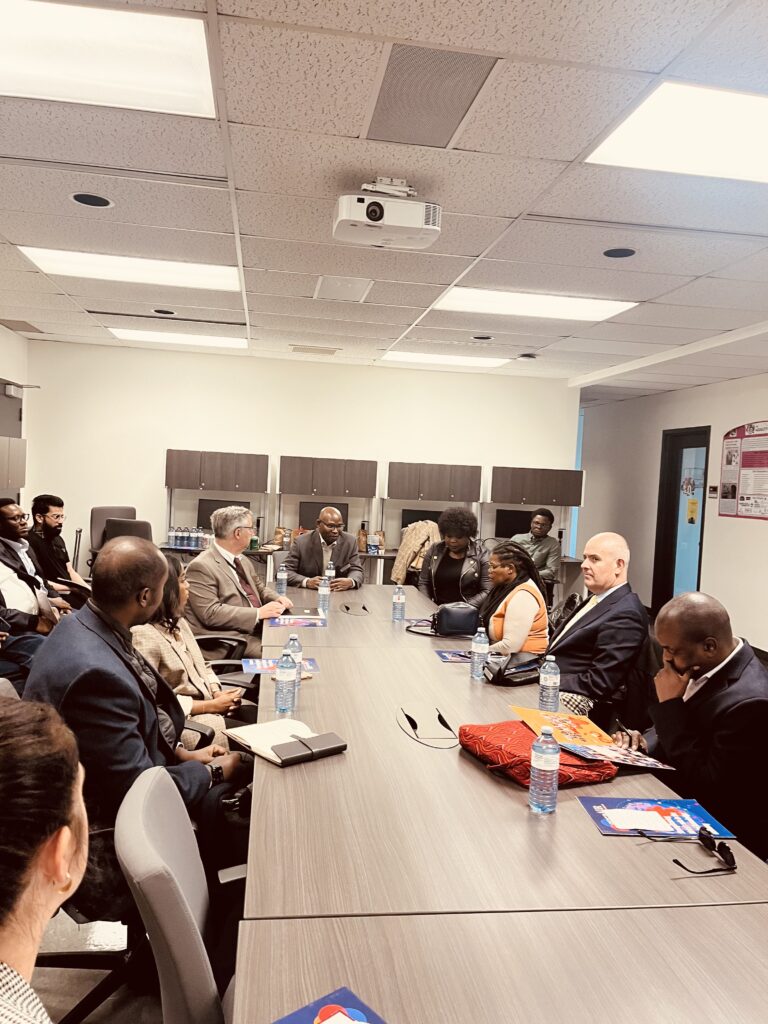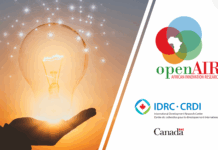The Open African Innovation Research (Open AIR) Network recently hosted officials from South Africa’s Department of Science, Technology, and Innovation (DSTI) at the Centre for Law, Technology and Society at the University of Ottawa. The meeting primarily focused on collaborative opportunities in innovation governance, capacity building, and knowledge sharing.
Representing an open range of expertise were Professors of the University of Ottawa’s Faculty of Law, representatives from the Innovation, Science and Economic Development (ISED) Canada, Open AIR’s Post-doctoral and doctoral researchers, as well as the South African delegation.
The meeting commenced with a warm welcome from the Dean of the Faculty of (Common) Law, Kristen Boon, followed by an address from the Deputy Director-General for International Cooperation & Resources, DSTI, Mr. Daan du Toit. Mr. du Toit outlined South Africa’s commitment to enhancing innovation within a robust governance framework. In line with the prospects of Africa’s role in shaping global governance structures, he stressed the importance of collaborative efforts, particularly in addressing emerging issues such as artificial intelligence, climate change, and Intellectual Property.

Mr. du Toit was keen about Open AIR’s work and stressed the need to involve research networks to boost Africa’s contributions to global innovation. The spirit of partnership was echoed throughout the meeting, forming the basis for a conversation hinged on inclusion, interdisciplinary research, and actionable outcomes.
Prof. Chidi Oguamanam, Co-Director at Open AIR, provided an overview of the network’s mission and achievements. Open AIR, he explained, is dedicated to exploring the role of innovation in Africa through a lens that prioritizes inclusion and interdisciplinary collaboration.
A short video presentation offered a preview of the network’s extensive work, which spans fields like artificial intelligence, intellectual property, and traditional knowledge governance. Prof. Chidi highlighted that Open AIR confronts conventional metrics of innovation, which often fail to account for the informal sector—a vital component of African economies. The network’s commitment to epistemic inclusion—i.e., integrating diverse knowledge systems into global innovation agendas—was a recurring theme. Prof. Chidi demonstrated how Open AIR draws on expertise from various disciplines and operates through hubs in South Africa, including those at the University of Cape Town and the University of Johannesburg.
The conversation transposed into the practical impact of research on policymaking, where Mr. du Toit posed a critical question of how Open AIR ensures its work influences government policies in Africa. This, he noted, was vital for turning academic efforts into real-world change.
Prof. Chidi acknowledged the challenge but offered concrete examples of Open AIR’s approach. The network adopts a “ground-up” strategy, immersing researchers in the field to ensure their work reflects local realities. For instance, the Network’s projects have examined Ghana’s cocoa sector and Ethiopia’s coffee industry to explore how innovation progresses in these contexts.
Furthermore, Open AIR has established strong ties with regional organizations like the African Union (AU), contributing to critical policy discussions on relevant regional and continental issues. Indeed, Open AIR’s emphasis on building communities of practice has also been crucial in ensuring its research resonates with policymakers, practitioners, and the broader public.
A defining moment of the meeting came when Open AIR’s doctoral students and post-doctoral researchers engaged with the delegation. Representing diverse fields and African perspectives, the students raised important questions about fostering diversity, truncating the instances of brain drain and creating opportunities for African diaspora experts to contribute to their home countries.
The delegation was impressed by the students’ commitment, revealing the importance of leveraging expertise to strengthen Africa’s public sector and governance.
The meeting climaxed with both parties reaffirming their commitment to collaboration. The DSTI delegation expressed respect for Open AIR’s work, particularly its focus on capacity building and inclusive governance. Prof. Chidi, reemphasized the importance of South Africa’s leadership in traditional knowledge and innovation governance, calling it an inspiration for the continent.
“For too long, Africa’s contributions to global innovation have been undervalued,” Prof. Chidi remarked. “Through partnerships like this, we are building a future where African innovation systems are not only recognized but celebrated.”










